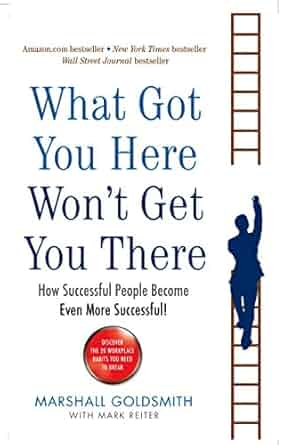After a break of more than a year, I realized that the intellectual stimulation provided by books is irreplaceable and decided to dive back into reading. I began with the contemporary classic What Got You Here Won’t Get You There by Marshall Goldsmith, a recommendation from my coach.
As the title suggests, this book is tailored for seasoned leaders who find themselves plateauing at a certain level and are seeking strategies to unlock their potential and progress further. Goldsmith highlights 20 habits that can hold leaders back, many of which are strikingly relatable.
The book opens by explaining a phenomenon called the “success delusion.” Our past successes give us confidence and motivation, which are vital, but they can also make us resistant to change. This confidence often fosters a superstitious belief in the status quo, which can impede growth and innovation.
Goldsmith identifies 20 behavioral flaws in leadership that act as barriers to advancement. They are:
- Winning too much: The need to win at all costs and in all situations – when it matters, when it doesn’t, and when it is totally beside the point.
- Adding too much value: The overwhelming desire to add our two cents to every discussion.
- Passing judgment: The need to rate others and impose our standards on them.
- Making destructive comments: The needless sarcasms and cutting remarks that we think make us sound sharp and witty.
- Starting with “No,” “But,” or “However”: The overuse of these negative qualifiers which secretly say to everyone, “I am right. You are wrong.”
- Telling the world how smart we are: The need to show people we are smarter than they think we are.
- Speaking when angry: Using emotional volatility as a management tool.
- Negativity, or “Let me explain why that won’t work”: The need to share our negative thoughts even when we were not asked.
- Withholding information: The refusal to share information in order to maintain an advantage over others.
- Failing to give proper recognition: The inability to praise and reward.
- Claiming credit that we don’t deserve: The most annoying way to overestimate our contribution to any success.
- Making excuses: The need to reposition our annoying behavior as a permanent fixture so people excuse us for it.
- Clinging to the past: The need to deflect blame away from ourselves and onto events and people from our past; a subset of blaming everyone else.
- Playing favorites: Failing to see that we are treating someone unfairly.
- Refusing to express regret: The inability to take responsibility for our actions, admit we are wrong, or recognize how our actions affect others.
- Not listening: The most passive-aggressive form of disrespect for colleagues.
- Failing to express gratitude: The most basic form of bad manners.
- Punishing the messenger: The misguided need to attack the innocent who are usually only trying to help us.
- Passing the buck: The need to blame everyone but ourselves.
- An excessive need to be “me”: Exalting our faults as virtues simply because they’re who we are.
Each of these habits is accompanied by detailed examples in the book, but even the titles alone are enough to spark introspection. Most of us can recognize some of these traits within ourselves or those around us.
The book’s most valuable insight for me was its seven-step approach to overcoming these limiting behaviors. These steps offer a practical framework to evolve as leaders and individuals:
- Feedback: Actively seek honest input from others.
- Apologizing: Acknowledge mistakes and express genuine regret.
- Telling the world / Advertizing: Communicate your commitment to change.
- Listening: Truly hear and understand others.
- Thanking: Show appreciation for feedback and support.
- Following up: Regularly check in to track progress and reinforce change.
- Practicing feedforward: Focus on future improvements instead of dwelling on past mistakes.
In summary, What Got You Here Won’t Get You There is a must-read for leaders who aspire to break through barriers and achieve greater success. Goldsmith’s insights and actionable advice are invaluable for anyone striving to become a better version of themselves.
